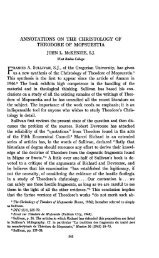episkopë and episkopos: the new testament evidence - Theological ...
episkopë and episkopos: the new testament evidence - Theological ...
episkopë and episkopos: the new testament evidence - Theological ...
Create successful ePaper yourself
Turn your PDF publications into a flip-book with our unique Google optimized e-Paper software.
336 THEOLOGICAL STUDIES<br />
common goods; he is a teacher <strong>and</strong> inspector of <strong>the</strong> doctrine of <strong>the</strong><br />
members of <strong>the</strong> community.<br />
No cultic or liturgical role is assigned to <strong>the</strong> presbyter-bishops in <strong>the</strong><br />
Pastorals. The closest to that in <strong>the</strong> NT is James 5:14-15, where <strong>the</strong><br />
presbyters of <strong>the</strong> church are called in to pray over <strong>the</strong> sick person <strong>and</strong><br />
anoint him in <strong>the</strong> name of <strong>the</strong> Lord, so that "<strong>the</strong> prayer of faith will save<br />
<strong>the</strong> sick person." This passage in James confirms <strong>the</strong> existence of presbyters<br />
in a non-Pauline church of Jewish origins where <strong>the</strong> name of<br />
James (<strong>the</strong> bro<strong>the</strong>r of <strong>the</strong> Lord) was venerated, <strong>and</strong> may be related to<br />
<strong>the</strong> information found in Acts about James <strong>and</strong> <strong>the</strong> presbyters at Jerusalem.<br />
Ano<strong>the</strong>r work, 1 Pet 5:1-4, addressed to Gentile churches of<br />
nor<strong>the</strong>rn Asia Minor, shows <strong>the</strong> existence of presbyter-bishops in an area<br />
where evidently Peter was looked upon as an authority. 31 The idea that<br />
Peter spoke as a "fellow presbyter" telling presbyters how to behave is<br />
not unlike that of Paul in <strong>the</strong> Pastorals giving <strong>the</strong> qualifications for<br />
presbyter-bishops. Thus, in churches associated with <strong>the</strong> three great<br />
apostolic figures of <strong>the</strong> NT, Paul, James, <strong>and</strong> Peter, presbyters were<br />
known <strong>and</strong> established in <strong>the</strong> last third of <strong>the</strong> century.<br />
In <strong>the</strong> letters of Ignatius of Antioch <strong>the</strong> bishop has unique authority in<br />
relation to baptism <strong>and</strong> <strong>the</strong> Eucharist, but we find no word of this in <strong>the</strong><br />
NT. In comparison with <strong>the</strong> silence as regards presbyter-bishops, various<br />
figures are said to baptize, e.g., members of <strong>the</strong> Twelve (Mt 28:19; Acts 2:<br />
41; 10:48), Philip <strong>the</strong> Hellenist leader (Acts 8:38), <strong>and</strong> Paul <strong>the</strong> apostle<br />
(1 Cor 1:14-17—but "Christ did not send me to baptize"). As for <strong>the</strong><br />
Eucharist, we know virtually nothing of who presided in NT times. The<br />
instruction "Do this" in commemoration of Jesus is given to <strong>the</strong> Twelve<br />
in Lk 22:19 (1 Cor 11:24), but not in Mark/Mat<strong>the</strong>w. According to Acts<br />
13:2, in <strong>the</strong> church of Antioch prophets <strong>and</strong> teachers "liturgize" (leitourgein).<br />
This finds an echo in Didache 10:7, "Allow <strong>the</strong> prophets to<br />
'eucharistie* [eucharisteiri] as <strong>the</strong>y will." 32 Between <strong>the</strong> NT position,<br />
where prophets <strong>and</strong> teachers have a liturgical role, <strong>and</strong> <strong>the</strong> Ignatian<br />
position, where bishops <strong>and</strong> presbyters have that role, comes (logically<br />
<strong>and</strong> perhaps chronologically) <strong>the</strong> situation in Didache. 33 In <strong>the</strong> church<br />
addressed by that work <strong>the</strong>re are still prophets <strong>and</strong> teachers, with<br />
prophets conducting <strong>the</strong> Eucharist; yet <strong>the</strong> author urges, "Appoint for<br />
yourselves bishops <strong>and</strong> deacons.. .for <strong>the</strong>y are your honorable men toge<strong>the</strong>r<br />
with prophets <strong>and</strong> teachers" (Didache 15:1-2).<br />
31 Letters of pastoral concern, closely similar to Pauline style, attributed to Peter, portray<br />
him as having an apostolic care for specific churches <strong>and</strong> confirm <strong>the</strong> observation that of<br />
<strong>the</strong> Twelve Peter came closest to <strong>the</strong> Pauline notion of an apostle.<br />
32 Association of <strong>the</strong> prophet with <strong>the</strong> Eucharist is not so strange when we realize that<br />
<strong>the</strong> NT prophets, men <strong>and</strong> women, often know <strong>and</strong> predict <strong>the</strong> future; <strong>and</strong> <strong>the</strong> Eucharist<br />
was thought to proclaim "<strong>the</strong> Lord's death until he comes* 1 (1 Cor 11:26).<br />
33 A chronology that has considerable plausibility in my mind is ca. 80-90 for <strong>the</strong><br />
Pastorals, ca. 100 for <strong>the</strong> Didache, <strong>and</strong> 110 for <strong>the</strong> Ignatian letters.
















